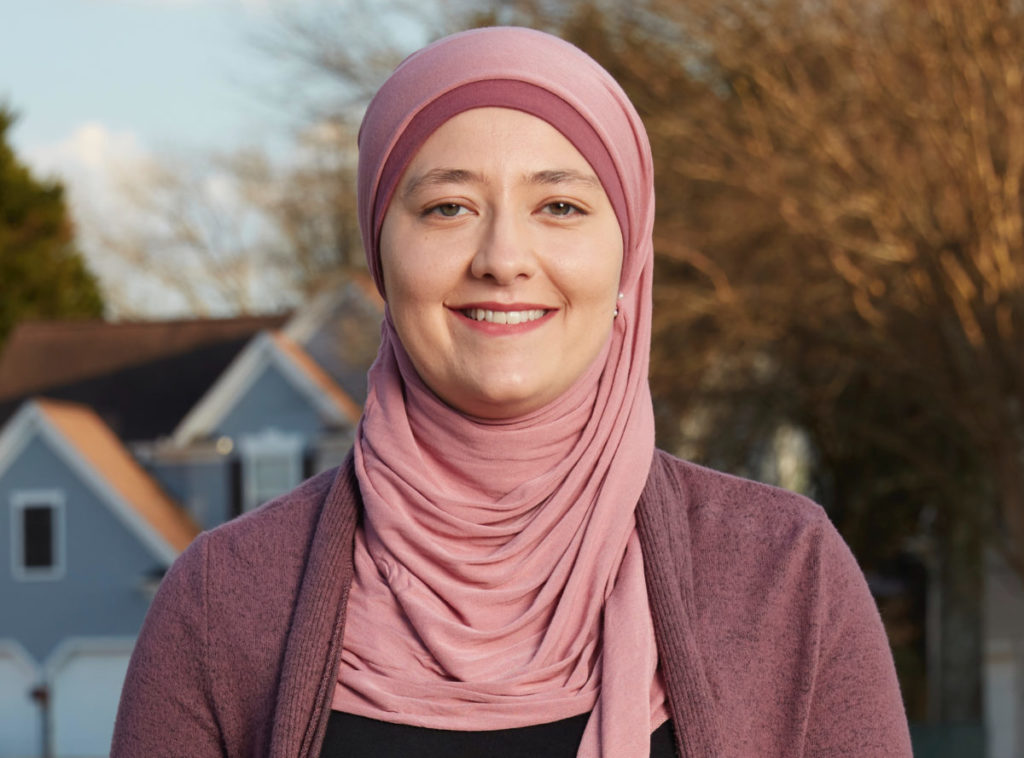
[Note: The Story Exchange will be writing about women candidates running for office in 2022 throughout the year.]
A run for office? Before this year, Ruwa Romman’s answer was consistent: “No.”
Despite a love of campaigning that the 29-year-old community organizer has cultivated through volunteering for progressive politicians, “I never had the desire to be a candidate,” she says. Yet she’s now nearly half a year into her own grassroots effort to represent Georgia’s 97th House district as a Democrat.
Romman, who by day works as a senior consultant at Deloitte, has always been interested in politics – she has volunteered in every election cycle since 2014, and done policy analysis and public speaking at the Georgia Muslim Voter Project, and Council on American–Islamic Relations, among others.
It was through some of that work that she found herself attending a candidate training seminar last fall. But she was only there to offer feedback to a colleague. A reporter in attendance, however, quoted her as a woman running for office. And once the article went up, so did her incoming calls – to offer overwhelming support for the notion. “People were offering to pledge money, or time,” she recalls.
Excitement around her then-imaginary candidacy only grew, so she decided to take the leap, tapping into one of her core beliefs to steel herself: “We can genuinely change our world – we just need to show up.”
It’s especially true for Romman – if the Jordanian immigrant wins, she’d be the first Muslim woman ever elected to the State Assembly.
Finding Her People and Path
Romman, the granddaughter of Palestinian refugees, was born and lived in Jordan until age 7. Then she and her family came to the United States, taking up residence in Georgia.
They moved around the state several times, which made it “hard, especially in the first 8 years of my life here, to develop community.” Yet that time was also informative, she adds – especially as she rarely encountered other people of color. “It taught me to be resilient, and to talk to people who are different than me from an empathetic place – even if they don’t always deserve it.”
As a student – first at Oglethorpe University outside Atlanta, then at Georgetown University’s McCourt School of Public Policy – Romman became interested in volunteering for political candidates who espoused her liberal ideologies. She realized that there were “a lot more people who shared my values rooted in justice, fairness and equality in Georgia than I was led to believe.”
That is perhaps due to Georgia’s contentious electoral landscape. Its elections have been garnering national attention since its 2018 gubernatorial election, when then-Secretary of State Brian Kemp, a Republican, won out over historic Democratic candidate Stacey Abrams. He was accused of hindering the process at numerous turns. Once in office, Kemp signed a law that added numerous hurdles for Georgia voters.
Seeing this this play out up close led Romman to a career in advocacy – doing consultation and communications work for numerous political outreach organizations. Then, when her district was redrawn at the end of 2021 – amid a series of controversial district reassignments – she was no longer able to resist running to represent it.
In addition to voter rights, Romman’s campaign is focused on education and healthcare – both pressing matters for Georgia, which ranks 30th in the nation in educational performance, and 49th in the nation for its healthcare system – as well as climate change, as both floods and droughts are predicted for the coastal state.
Romman has scored endorsements from organizations like Fair Fight, the Georgia Working Families Party and the Asian-American Advocacy Fund, as well as elected officials from around the state. It remains to be seen whether that will help her advance her past JT Wu, a childhood literacy nonprofit found and the other Democrat vying for the State House seat. Whoever prevails will then go up against Republican John Chan in the general election, now that incumbent Bonnie Rich has withdrawn.
But should the May 24 primary or November 8 election not go her way, Romman also has several “non-winning goals” baked into her campaign – objectives she’d still like to achieve in the event of a loss, chief among them harnessing the voting power of fellow Muslims in Georgia.
Because either way, she’s more interested in what her candidacy alone has meant to voters. “For a long time, I pushed my parents to register to vote, and then to vote. To see them and their enthusiasm [grow] over time, like a lot of our community, who were historically excluded and never saw themselves in this space – I was really excited about it,” Romman says. “If nothing else, I would prove we have a place in this world.”




